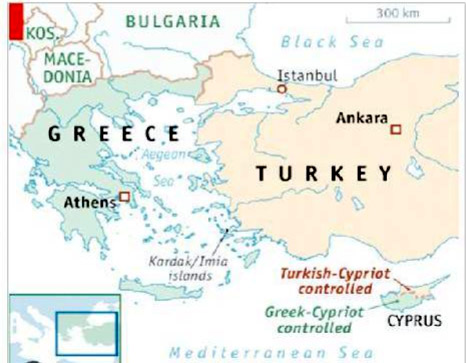K N Pandita
President Erdogan of Turkey omitted Kashmir in his address to the UN General Assembly. In doing so he deviated from his practice of raking up the Kashmir issue and supporting Pakistan’s stand at the UN since 2019.
This change of stance is variously interpreted, Turkey’s sudden interest in raking up the Kashmir issue is to be linked with Erdogan/s aspiration to snatch the leadership of the Muslim world from the hands of Saudi Arabia. This is to fulfil the dream of a revival of Ottoman glory.
Pakistan also hobnobbed with Turkey’s ambition but after receiving a snub from the Saudi Crown Prince retracted its steps, Erdogan believed pandering to a pro-Pakistan stance on Kashmir would strengthen his claim to the leadership of the Islamic world.
India dismissed Erdogan’s rhetoric on Kashmir at the UNGA as far from the facts of the case and also interference in the internal affairs of sovereign India.
Indian Extremal Minister Dr S Jaishankar retaliated with an astute diplomatic move. Instead of entering into an argument with Erdogan, he brought forth the Aegean and Eastern Mediterranean conflicts.
The conflict between Turkey and Greece is largely over whether the Greek islands are allowed an exclusive economic zone, the basis of claiming rights over the sea. Greece claims 10 nautical miles (19 km) of airspace, as opposed to currently 6 miles of territorial waters. Since 1974, Turkey has refused to acknowledge the validity of the outer 4-mile belt of airspace that extends beyond the Greek territorial waters.
Turkey and Greece both are members of NATO. In an earlier event when NATO and Turkish Air Force were conducting an air exercise over the Aegean Sea, Greece jammed their radio connectivity alleging that the aircraft were violating Greek air space.
NATO is worried that escalation between the two of its member countries located in a sensitive region could invite direct or indirect intervention by Russia. Lately, Erdogan has realised that India is very close to Russia and would not pay heed to the warnings of the US.
It should be noted that India rejected the offer made by President Biden that NATO would welcome India joining it as a member. India bluntly said that NATO was created by the US and her allies to counter Russia but India was not going to be a party to it.
At the invitation of the foreign minister of the Hellenic Republic, H.E. Mr. Nikos Dendias. Dr S. Jaishankar paid an official visit to Greece on 25-27 June 2021. On the occasion of the 200th anniversary of Greek independence, the External Affairs Minister conveyed felicitations of the President and the Prime Minister of India to the Government and the people of Greece.
He paid a courtesy call to H.E. Mr. Kyriakos Matsutakes, Prime Minister of Greece, and had bilateral talks with his counterpart, H.E. Mr. Nikos Dendias. He also unveiled the statue of Mahatma Gandhi in Athens on 26 June 2021. The statue will act as a strong symbol of friendship between the two countries.
The Joint Press Conference Release issued after the meeting between the two foreign ministers contains 13 clauses including two clauses that are of much significance in the context of the Aegean Sea conflict. The clauses say this:
Both sides also shared views on regional and global issues of mutual interest in the context of new geo-political and geo-economic realities, including the Indo-Pacific. Both sides noted with satisfaction the convergence of each other’s vision for a free, open, inclusive and cooperative Indo-Pacific ensuring connectivity and growth for all in the region.
Both sides discussed the recent developments in the Eastern Mediterranean, Cyprus and Libya.
Turkey is eager to win the membership of BRICS of which India is a founding state. The BRICS summit is going to be held shortly and Erdogan is canvassing for its membership. Keeping in mind how it has put itself in an awkward position by raking up at the UNGA the Indian Parliament’s J&K Reorganization Act of August 2019, Erdogan is not hopeful of BRICS accepting its membership that easily.
Lastly and most importantly the rising crescendo of India as an economic and military power whose voice matters in important geo-political discourse, Erdogan has been realistic in his international diplomacy. India is determined to press for far-reaching reform of the Security Council — the expansion of permanent membership so that a huge population of the globe is not left unrepresented. Erdogan has also been of the same view when he said, “The world is bigger than five members.”
The free and fair election to the State Assembly of J&K, will belie the false propaganda about Kashmir with which Pakistan has fed Erdogan. While the Dawn newspaper of Pakistan claims that the omission of Kashmir in Erdogan’s thirty-five-minute speech in the UNGA does not reflect any change in his five-year-old stance on the Kashmir dispute, the same paper quoted Maleeha Lodhi, once Pakistan’s representative to the UN saying that Erdogan’s omission of reference to Kashmir dispute reflected a change in Turkey’s stance.


